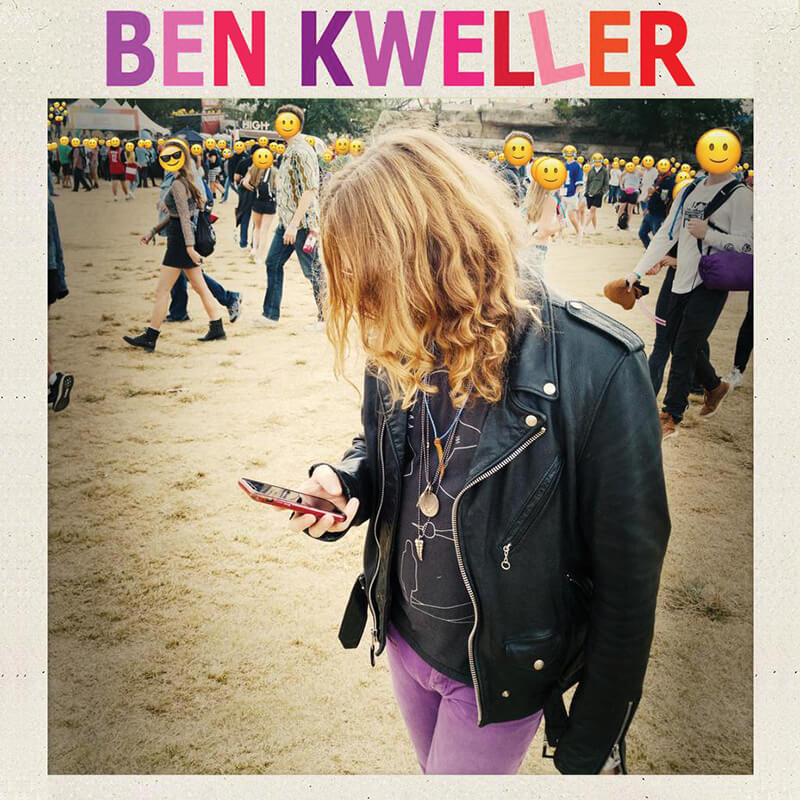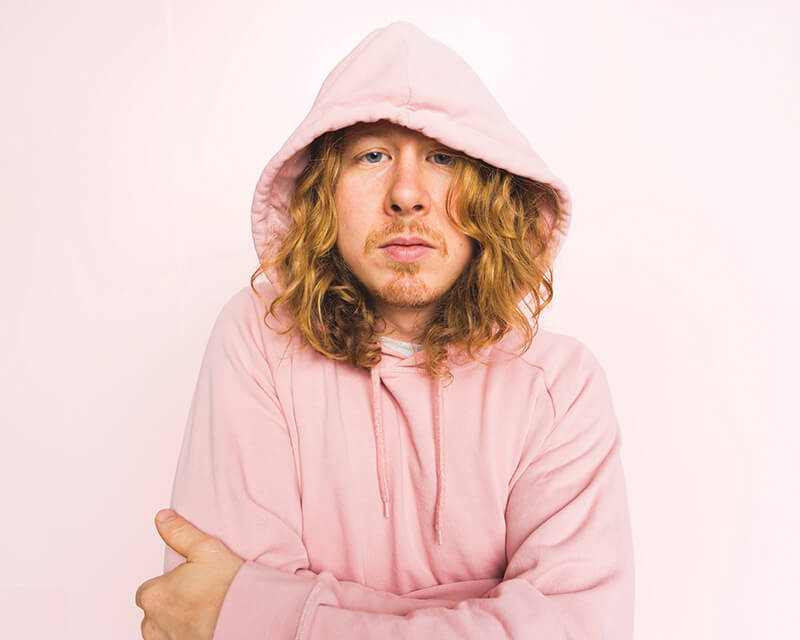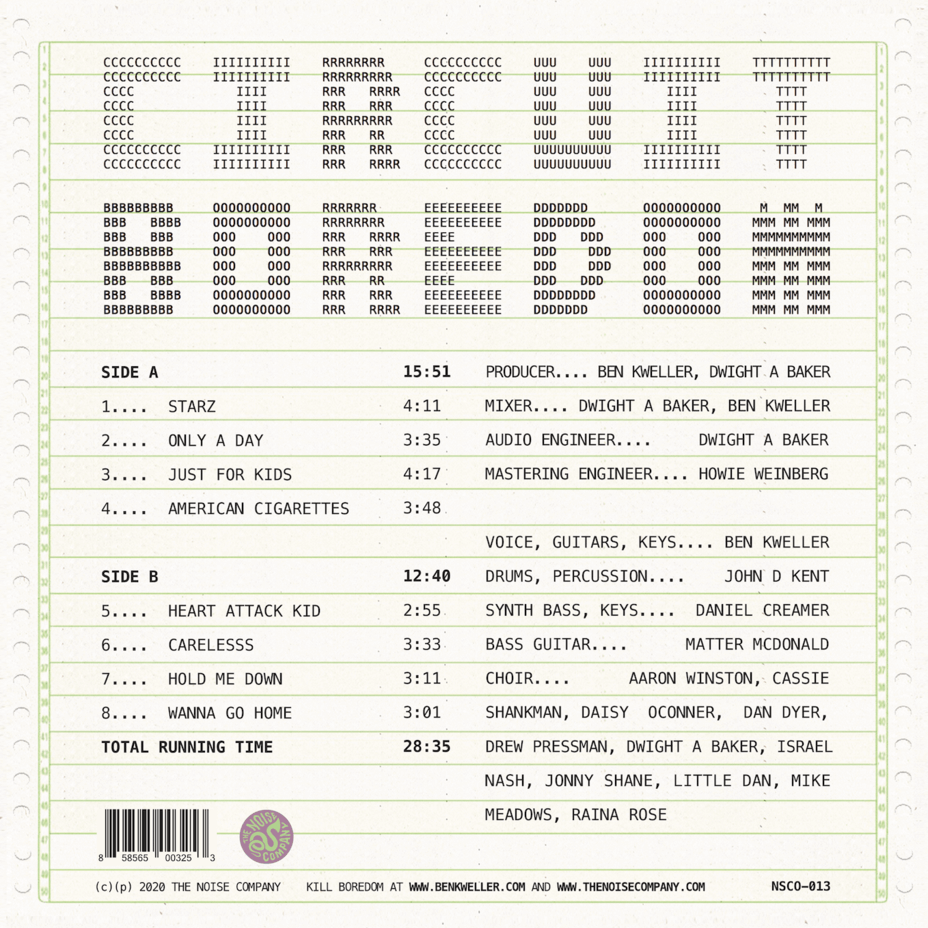Ben Kweller needs no introduction…but he deserves one, so here goes. The mop-topped indie kid who broke onto the scene with Radish two decades ago is now, without question, one of the best pop songwriters of his generation. We don’t know how he’d like being described as pop [we didn’t ask], but damnit if he hasn’t composed some of the slammin’est, catchiest songs in recent memory. Everything on his 2006 self-titled LP is flawlessly written and builds upon the brilliant Sha Sha and On My Way that came before. Then we were treated to an equally compelling foray into country territory, followed by the severely underappreciated Go Fly a Kite.
Kweller is back this fall with a new slab of vinyl (on Coke-bottle green wax, no less), and we caught up with him in his Texas home to see how he’s coping with the state of the world, how he’s managing to stay creative and why he can’t get better high-speed internet out in the sticks.

Hey Ben, I’m really psyched to talk to you.
It’s funny, as an “indie- preneur,” as I like to call myself [laughs]…I think it’s pretty good, I coined that shit! I went to [your] website and immediately saw some nerdy things that I’m like, ‘Ooh! I gotta read that article about key insurance concepts for musicians!’ [laughs]
You know what? We try to make insurance fun!
You sure did, and I also enjoy that you got a kick out of the word ‘inland marine’ much like myself back in 2002 when I first had to get inland marine insurance for the first time. I appreciate you what you guys are doing because it’s very much the world that I live in ’cause…one of my favorite things is mentoring other artists, as well. And I’ve been able to do that with the Noise Company, which is my label and management company and there’s real world situations that are otherwise super boring that we have to deal with as musicians.
You know, you mentioned something important a few minutes ago, which is “if you’re going to make this a career” — because there’s a lot of bands who get into this and they think, “Oh, it’s all gonna be fun and games, trashing hotel rooms…and they don’t really understand that this is a business and you have to treat it as such.
I know. I totally know and that’s really the number one thing that I first tell up and coming artists when they come to me. ‘How do you do it? How do you last in this world and keep making the music you want?’ and my main thing is I first say if you’re good at something else, you might want to pursue that. You know, at first just to see. But if you don’t have a backup plan and music really is THE thing, then now you’re talking, you know, because that’s kind of how it has to be.

So, do you think it’s detrimental for artists to have a fall back? Does that mean that they may be not as committed as going full-steam ahead?
No, I don’t think it’s detrimental. In fact, I think a fallback is great because chances are music as your primary [career] is gonna be very difficult, you know? And I’ve had lucky breaks here and there, but I’ve been so freaking persistent, you know? There’s so much to it and every artist is so different…I came up in a much different time, as well. You know, there wasn’t social media in the early 2000s.
When I was coming up in New York and it was me and the Strokes and the Moldy Peaches and that whole garage revival thing that was happening, it was really just stapling flyers to lampposts.
So how were you distributing stuff back then? Because I seem to remember getting a hand-burned CD-R of your stuff passed to me in a dorm room, in maybe 2000 or 2001…
[laughs] Yes! I mean that was it. That was burned off of my first Macintosh computer. I had a blue and white Power Mac tower. I wanted one of the fruity colored iMacs, but the guy at the Apple store — I don’t even think they had Apple Stores! — no, it was just a computer store. And he said if you do music, you really got to get the tower. You can upgrade the megabytes and all that and at the time it probably seemed really fast with only like a few gigs, you know? [laughs]
Oh yeah, I remember those old G3 Towers with like a 300-megahertz processor.
That was it! Power PC!

It had the little hinge on the side, you could open it up.
That was it, man. Well, it was kind of crazy because before…it was my band Radish when I was a teenager and when I moved to New York in 1999, technically we were still signed to Mercury Records.
Yeah, so you had label support behind you, right?
Well…Radish did. We had label support for one album. And then we wanted to spread our wings and I wrote this complete opus, it was a double album with 18 songs, and I delivered it to the record label, and they didn’t know what to do with it. And Mercury got bought by Polygram or Universal bought Polygram? Some big corporate merger happened. And there were all new people that came in. And no one wanted to do anything with Radish because they were like, ‘We didn’t find you. It was the old regime that signed you.’ But they were like, maybe we can do something with you – ‘we’ll see’ – and so it was kind of the typical major label ‘sit around and wait’ [thing].
So, I eventually got frustrated with that, and I started recording my own songs on that blue and white Mac, and I burned CDs and the first quote, unquote real one, was called Freak Out, It’s Ben Kweller. And that one…I actually mass produced like 1000. And that’s the one that got in the hands of Evan Dando. He was the first connector that really changed everything for me.
Because up until that point it was all just music industry people that were kissing my ass and all this bullshit, but when Evan got a copy of the CD-R, it was actually this artist that I respected and looked up to…
So, that was real validation for you?
Exactly.
And since then, you’ve been pretty much DIY for the most part. Is that right?
Yeah, pretty much. Pretty soon after that, ATO Records was starting out and one of the founders of that label, Michael McDonald, not from the Doobies! He came up to me at a gig that I was playing with Evan Dando and Ben Lee, and he said, ‘We’re starting a record label with Dave Matthews and we really love the CD and we’d love to talk to you.’ And I basically signed right away with them — like the day that I signed the release papers for Radish, I signed as a solo artist to ATO.
Then we went on to obviously put out [the next few records] and that was it, at that point. We decided to move to Texas, my wife and I and we had our first son Dorian. And my deal was up with ATO in 2008 or 2009… So, I did one more record with ATO and I wanted to make this country record because my whole life, I would always write different songs and kind of put ’em in different buckets and every once in a while, a country song would pop out.
And then after my self-titled record was done, I’m going through my notes and I was looking at the country album list and I was like ‘Oh, Shit, man, I should just record these.’ I did my first four albums in New York City, grew up in Texas, thought it would be nice to kind of get out of the city, and obviously if I’m going to do some country music I might as well get back to my homeland of Tejas.
So, we actually rented out Spoon’s studio in Austin, which is one of my favorite studios here and recorded Changing Horses — and at that same time in the back of my head I knew that it was the last album with ATO, according to the contract – we had a great tour, toured all over the world on it, and it was really fun to introduce a bunch of these indie rocker kids — my fans — to the pedal steel and Dobro. Everyone was like, ‘Wow, you’re making country cool. How did you do that?’ I’m like, country IS cool, man! [laughs]
After that album cycle, we had a sit down together and decided to start our own label.
Did you have any lingering issues with ATO or you just felt it was time to do your own thing?
It was just time to do my own thing. I love ATO. I’ll always be an alumni of ATO. I was their first signing…their first worldwide signing. They licensed a David Gray album which did so well for them and that really was their infusion to go kick ass as a label. And that will just always be something that we’ll both share together, you know?
I just wanted control, you know. I’m a very inquisitive person. I like to know how shit works behind the scenes…even if it’s ugly and dirty…I want to see it.
I wanted to know that if something is gonna fail, I at least want it to fail on my own terms and know that we gave it our best shot instead of just being another artist sitting on the sidelines hoping that someone else is going to make something happen on my behalf, which I feel like at that point I had been doing, you know?
There’s things that I loved about being on a label, but what I’m able to achieve with my team now and really being a business owner, as cheesy and horrible as that sounds, I’ll take that over anything else any day.
Was the first thing you did on your own Go Fly A Kite?
Yeah, and that almost brings us up to present day. That was only a couple of years ago.
So, I’ve got to ask the big question. 2020’s been kind of a cluster for most people. How have you been holding up? And is that kind of what spurred the new record? Or was it already in the works…
Yeah, I was actually gearing up — 2020 was gonna be super kick ass…
Did you have a tour planned like everyone else?
Exactly. I had great touring stuff through the summer and actually perhaps biggest of all — what I was most excited about, was I was flying to England to write with Ed Sheeran for his new album. And that got cancelled. I was supposed to leave like March 20th — it was right, RIGHT when everything happened.
That was actually the biggest bummer for me personally, just because I was so excited for that, and he’s such a great writer and a great friend. And that invite meant the world to me, and hopefully we will make it happen again. But yeah, it’s kind of funny because me and Lizzy were kind of laughing about it last night. Everyone is obviously asking [us], ‘How is the music business,’ you know? And it’s almost like we’re so used to reinventing the wheel…
Who were the first people to pop up with a new business plan [when COVD-19 hit]? It was all these bands doing live stream concerts or saying, ‘Alright, I gotta make a buck somehow. I’ll figure out Zoom, sure.’
Exactly!

Were you able to record the entire record before things shut down?
I finished it right before the lockdown. And I was able to get it mastered during the lockdown because that was easy. The guy that always masters my stuff is Howie Weinberg. I love him and at this point I can just send him stuff and I don’t even give him notes anymore, he just knows what I like to hear. He’s a beast.
So here’s for all your readers who are interested in the behind-the-scenes stuff…Basically, the way it works is you can submit one track to editors and you hope to get playlisted and that really is the new name of the game — getting on playlists — so a few years ago when this became clear that this was how the DSP’s were basically conducting their business, all the hip-hop artists and pop artists were like, ‘Why would I upload my whole album to you if I can only submit one song for that playlist? You’re only gonna listen to one song, why give you my whole album? I’m just gonna keep giving you singles.’ And so that really is a big reason that we’re back in the single culture, which in a lot of ways I love, man!
Me too, sometimes I love just stacking up a bunch of 45’s and running through them, you know?
Yeah, exactly dude! And it’s kinda cool. I dig it — I love the album as an art form. I’ll always love albums and there’s nothing like a good album but I’m afraid the attention span of people is just diminishing…which kind of brings me to how I’m rolling out Circuit Boredom.
Are you doing it one track at a time?
Well, I have done a single here and there and I’m building up…basically kind of dripping out singles, but I’m releasing physical first. We just announced the vinyl pre-order.
And you’re getting that pressed locally, right?
Yeah! We have a new vinyl plant that’s really cool. It’s called Gold Rush Records and they’re here in Austin. It’s an all-woman run business. Karen the owner, she used to work at Google and Google Music. So, she comes from a complete digital background. Similar to kind of the story behind my new album, I mean her whole thing was she was fed up with digital so she went completely the opposite way.
And then we’re gonna drop the album digitally on the DSP’s on January 1st to slam the door on 2020. So literally at midnight when everyone’s awake, the new Ben Kweller album will be live on all the [services].
Hopefully it’ll bring us better luck in 2021 than we’ve had this year.
I know, I know, hoping so!
Recording [the new record] was a little different because basically I recorded it with me and my drummer John [Kent], who was actually the drummer in Radish. Long story short…My family goes on vacation in New Mexico and Liz wakes up in the middle of the night…Something’s horribly wrong, like I feel really sick and so I stood up and fell to the ground immediately and we’re all feeling like we’re dying. Long story short, it’s carbon monoxide poisoning. We were in this little cabin on top of a mountain in New Mexico and ambulances finally arrived and we go to the hospital for days. We’re on oxygen — it was a nightmare and the doctor’s like, ‘You guys were 15 minutes away from not waking up.’ So, I get home and I called [everyone on the team] like, ‘I’m done, cancel everything.’
I almost died and I just I don’t wanna leave the house. I’m just done, you know? Weeks turned into months. Months literally turned into years. I don’t know how it happened, but I just was so depressed and had serious PTSD from this experience.
I didn’t want to record. But every once in a while, I’d write a song. And so, it would actually give me…every time I write a song it’s like, ‘Whoa. OK, my old friend songwriting.’ It’s still alive, you know? ‘So good to see you, Mr. Songwriting.’ At some point my friend Dwight Baker, really great producer, he called me up. ‘I know you’ve been super depressed. You don’t wanna do shit, I get that. But I also know you have all these songs. Just come to my house, to my studio, let’s just fuck around in the studio for a day. Just see what happens, ’cause maybe you’ll have fun.’ He was just trying to help his friend out…So I went over there, and we started recording stuff.
And I was like, ‘Oh my God, OK, this feels good.’ I basically called up John Kent, and I’m like, ‘Hey, let’s set up the drums and the Marshall stacks for old times’ sake and see what happens.’ So, he comes over and we started jamming in the barn and I felt like I was 15 again.
And I’m like, ‘OK, I can do this.’ So, John and I went back to Dwight and we booked two weeks and banged out this album — just him on drums, me on guitar and singing live.
Were you ready or were you still apprehensive getting back into it?
I got more and more ready as time went on…it has been really inspiring.
The creative mind never sleeps.
That’s it, dude!
Follow on Instagram @benkweller
Photos by David Kemper
